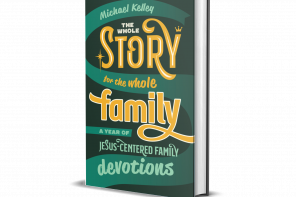Let me introduce a term to you – “issue creep.”
This is what happens when an issue – maybe even an important issue – ceases to become a matter of personal conviction or choice for a Christian and instead makes way into the central place in their minds. It’s when some ancillary issue starts to creep in on the place of the gospel, and we begin to see that issue as one of the essentials that cannot be compromised on, for anyone, at any time, if they are to also consider themselves Christians. And there are many instances of “issue creep” at work in the church.
For a while, the issue creep was about worship style. And ironically, it seems like it was happening from both sides. There were some who didn’t believe you could love Jesus and have drums on your stage, and there were others who believed you couldn’t love Jesus and not have them.
Bible translation has also been at the center of issue creep. There have been those that have argued that one must adhere to a certain translation of Scripture if they are truly a Christian, and any other translation puts a person at best on a lower tier and at worst outside of the Christian fellowship.
The list could go on. In each case, a particular issue begins to creep in on the territory that should be exclusively claimed by the gospel. And as a result, judgment abounds among the people of God as people feel a sense of superiority or enlightenment over others who do not share their same conviction.
Are these issues important? Yes – at least in some cases. But the problem comes when that which is important starts to edge in on that which is essential. And so here we find ourselves with another issue, which is very important especially to folks like me with kids in grade school, which for many is creeping into the realm of essential.
The issue is where, and how, your children go to school.
Complicating the issue are the choices that are now available to parents. You can of course go to public school. But which public school? The one in your neighborhood, or the one in the nicer neighborhood you have to stretch financially to get into?
Then again, you might go to private school for an education that the likes of The Fay School and other private educational institutions can offer. But then comes the questions of which private school? And where?
Then again, you might go to home school. But will you do the coop? The partial coop? The Classical Conversations model?
You get the idea. Now to be clear, this is indeed an important decision. Very important, in fact. But is this essential to our understanding of and living out of the gospel? It is not. And that’s the first principle for Christian parents:
1. Understand that choice of educational models is not a gospel issue.
Once you do this, you are free to really examine your options. You can think about your family’s culture, your child’s personality, and the financial viability of all the choices in front of you. Furthermore, you can actually seek wisdom from other parents who have been down different roads before, asking them about their experiences and learning from them without passing judgment on what they decided.
When we acknowledge that this is an important issue, but not one of gospel importance, then we are free to embrace the second principle:
2. You can’t choose to fight or not, but you can choose the battle.
As parents, we must recognize that no school – no matter how affluent, no matter biblically grounded, no matter how sheltered, or no matter diverse, is going to ensure anything in the lives of our kids. We cannot “school” them into Christianity, love for the lost, a rejection of materialism, or anything else. If we are looking for a particular model of school to do the work of evangelism and discipleship for us, then we are deluding ourselves and shirking our responsibility as parents.
So as a matter of principle, then, we must also recognize that no matter where our kids go to school, we are going to have a battle on our hands. In some cases, we will have to battle against materialism because our children are going to school in affluence. In other cases, we will have to battle against assimilation because of the peer pressure to accept all lifestyles as valid will confront them. In still other cases, we will have to battle with giving our children a realistic sense of the world because of their relative sheltering in their educational environment.
You know what? It’s going to be hard any way you slice it. So you can’t choose whether to fight; as a parent, you are going to have to. The question is which battle do you think you, and your family, are best equipped to be in. That’s the battle you choose, whether that means being in public or private, home school or not.
In the end, all of us as parents have to make a decision in faith. We have to believe that God has given us what we need, as parents, and that we can take hold of His wisdom by faith and walk forward. Make no mistake, we will walk forward into battle, but by God’s grace, we will not go there alone.
Subscribe to MichaelKelley.co
Never miss a new post. Subscribe to receive these posts in your inbox and to receive information about new discipleship resources.





Hi Michael, Thank you for this. I certainly agree that schooling is a free choice and I cannot tell you how many times I have been told that children should go to public school to see “real life” and to evangelize. I know all choices are criticized. The home schooled children I know are very social, like my own kids, and I don’t think assimilation is the biggest struggle. Carrying the responsibility day to day as a parent is the hardest part, and I do not sugarcoat that when people ask! My policy is not to bring up school choice unless someone asks me a question, because it is not the gospel. God is so much bigger than how our children are schooled! Thank you for this message.